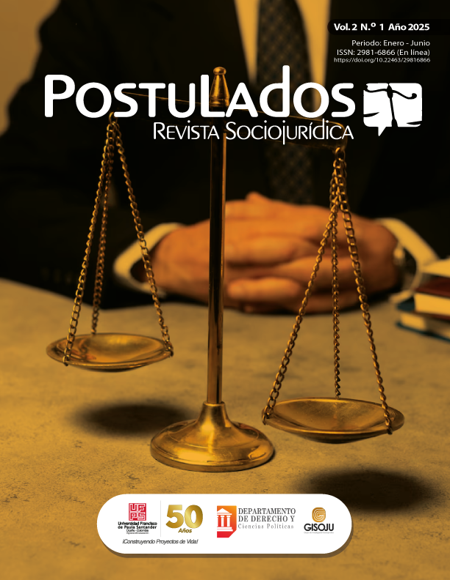New Children, Old Beliefs: The Impact of Birth on the Persistence of Social Conservatism, a possible analysis based on the 2018 Americas Barometer
Nuevos Hijos, Antiguas Creencias: El Impacto de la Natalidad en la Persistencia del Conservadurismo Social, un análisis posible a partir del Barómetro de las Américas 2018
Main Article Content
The present research, based on data from the Americas Barometer 2018, examines how religiosity and fertility influence social conservatism in Colombia. It investigates the correlation between attendance and the importance of religion in personal life, and the number of children, with conservative attitudes. Findings indicate that religious individuals are more likely to exhibit higher levels of conservatism, which intensifies with more frequent religious service attendance. Furthermore, family size impacts conservative stances, particularly within religious contexts, though the effect varies depending on the strength of religious conviction and the number of children.
Article Details
Fiorina, Morris P., Samuel J. Abrams, y Jeremy Pope. Culture war? the myth of a polarized America. 3rd ed. Great questions in politics. Boston, MA: Longman, 2011.
Guth, James L., Lyman A. Kellstedt, Corwin E. Smidt, y John C. Green. «Religious Influences in the 2004 Presidential Election». Presidential Studies Quarterly 36, n.o 2 (junio de 2006): 223-42. https://doi.org/10.1111/j.1741-5705.2006.00300.x.
Haidt, Jonathan, ed. The Righteous Mind: Why Good People Are Divided by Politics and Religion. 1. Vintage books ed. New York: Vintage Books, 2013.
Hungerman, D. M. (2014). The Effect of Education on Religion: Evidence from Compulsory Schooling Laws. Journal of Public Economics, 120, 15-29.
Jelen, T. G. (2002). Religion and Political Behavior in Latin America. University of Notre Dame Press.
Kelly, Nathan J., y Jana Morgan. «Religious Traditionalism and Latino Politics in the United States». American Politics Research 36, n.o 2 (marzo de 2008): 236-63. https://doi.org/10.1177/1532673X07309738.
Kluegel, James R., y Eliot R. Smith. Beliefs about inequality: Americans’ views of what is and what ought to be. Social institutions and social change. New York: A. de Gruyter, 1986.
Layman, Geoffrey C., y Edward G. Carmines. «Cultural Conflict in American Politics: Religious Traditionalism, Postmaterialism, and U.S. Political Behavior». The Journal of Politics 59, n.o 3 (agosto de 1997): 751-77. https://doi.org/10.2307/2998636.
Malka, Ariel, Yphtach Lelkes, Sanjay Srivastava, Adam B. Cohen, y Dale T. Miller. «The Association of Religiosity and Political Conservatism: The Role of Political Engagement: Religiosity, Political Engagement, and Political Conservatism». Political Psychology 33, n.o 2 (abril de 2012): 275-99. https://doi.org/10.1111/j.1467-9221.2012.00875.x.
Pew Research Center. «Political Polarization in the American Public», s. f. https://www.pewresearch.org/politics/2014/06/12/political-polarization-in-the-american-public/.
Vogl, Tom S., y Jeremy Freese. «Differential Fertility Makes Society More Conservative on Family Values». Proceedings of the National Academy of Sciences 117, n.o 14 (7 de abril de 2020): 7696-7701. https://doi.org/10.1073/pnas.1918006117.
Webb, P. (2020). Gender Politics and Conservatism: The View from the British Conservative Party Grassroots. Government and Opposition, 55(1), 61-83. DOI: 10.1017/gov.2018.23






